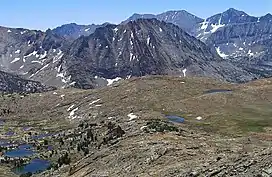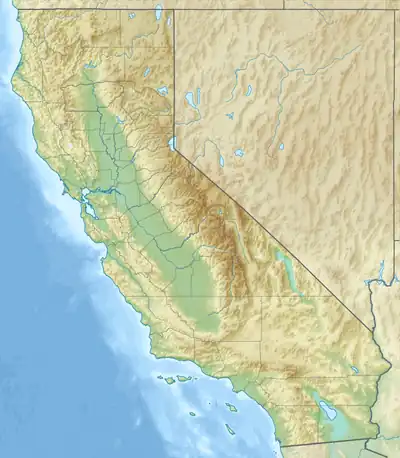Mount Cedric Wright
Mount Cedric Wright is a 12,372-foot-elevation (3,771-meter) mountain summit located one mile west of the crest of the Sierra Nevada mountain range, in Fresno County of northern California, United States.[1] It is situated in eastern Kings Canyon National Park, 13 miles (21 km) northwest of the community of Independence, 2.2 miles (3.5 km) southeast of Crater Mountain, and 2.5 miles (4.0 km) south-southeast of Mount Wynne and Pinchot Pass. Topographic relief is significant as the west aspect rises nearly 2,000 feet (610 meters) above the surrounding terrain in approximately one mile. The John Muir Trail traverses below the west aspect of this remote peak. The first ascent was made August 25, 1935, by Norman Clyde.[5]
| Mount Cedric Wright | |
|---|---|
 North-northwest aspect, from Pinchot Pass | |
| Highest point | |
| Elevation | 12,372 ft (3,771 m)[1][2] |
| Prominence | 722 ft (220 m)[3] |
| Parent peak | Colosseum Mountain (12,473 ft)[4] |
| Isolation | 1.17 mi (1.88 km)[4] |
| Coordinates | 36°54′15″N 118°23′16″W[1] |
| Naming | |
| Etymology | George Cedric Wright |
| Geography | |
 Mount Cedric Wright Location in California  Mount Cedric Wright Mount Cedric Wright (the United States) | |
| Location | Kings Canyon National Park Fresno County California, U.S. |
| Parent range | Sierra Nevada[3] |
| Topo map | USGS Mount Pinchot |
| Climbing | |
| First ascent | 1935 |
| Easiest route | class 2 hiking[3] |
Etymology
The peak's name commemorates George Cedric Wright (1889–1959), an internationally known wilderness photographer of the Sierra Nevada, and Ansel Adams's mentor and close friend.[1] The mountain's name was officially adopted in 1961 by the United States Board on Geographic Names.[1] Park ranger Randy Morgenson scattered Wright's ashes on the slopes of his namesake mountain.[6]
Climate
According to the Köppen climate classification system, Mount Cedric Wright is located in an alpine climate zone.[7] Most weather fronts originate in the Pacific Ocean, and travel east toward the Sierra Nevada mountains. As fronts approach, they are forced upward by the peaks, causing them to drop their moisture in the form of rain or snowfall onto the range (orographic lift). Precipitation runoff from the mountain drains into Woods Creek, a tributary of the South Fork Kings River.
See also
References
- "Mount Cedric Wright". Geographic Names Information System. United States Geological Survey, United States Department of the Interior. Retrieved 2021-04-16.
- Steve Roper, The Climber's Guide to the High Sierra, 1976, Sierra Club Books, ISBN 9780871561473, page 254.
- "Mount Cedric Wright, California". Peakbagger.com. Retrieved 2021-04-16.
- "Cedric Wright, Mount - 12,368' CA". listsofjohn.com. Retrieved 2021-04-16.
- Steve Roper, The Climber's Guide to the High Sierra, 1976, Sierra Club Books, ISBN 9780871561473, page 356.
- Blehm, Eric (2007). The Last Season. HarperCollins. p. 9. ISBN 978-0-06-058301-9.
- Peel, M. C.; Finlayson, B. L.; McMahon, T. A. (2007). "Updated world map of the Köppen−Geiger climate classification". Hydrol. Earth Syst. Sci. 11. ISSN 1027-5606.
External links
- Weather forecast: Mount Cedric Wright
- Mt. Cedric Wright photo: Flickr